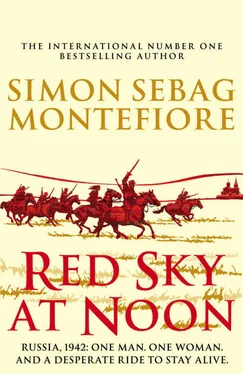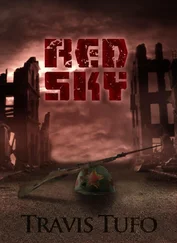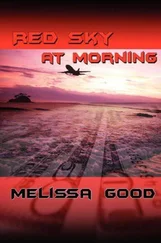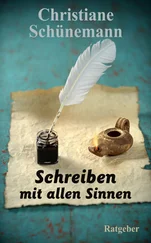Benya was still holding his Parabellum over Dr Kapto, who had been shot cleanly in the forehead. Now Kapto was dead, he was afraid to touch him. Garanzha searched the doctor for his papers. He found Kapto’s new ID as an officer of the Schuma, in German. Benya gathered up the maps that lay on the table, along with Manteuffel’s notebook, and put them all in the original satchel which he hung over his shoulder.
When they came out of the building, Panka was helping himself to tinned meat, chocolate and ammunition from the Germans’ saddlebags. The four mounted their horses. Benya’s hands were shaking: he couldn’t believe what he had done. He’d shot a man in cold blood. Without a word. Just like that. It was over. And now he rode on, untarnished. And yet the child – a little Jewish girl – was gone; she lay nearby somewhere on the rough ground, and he ached with sadness, for her, for his family, for Fabiana, and for all the others wounded in this cruel, cruel war.
‘Only a Cossack could sweet-talk a horse like I did with that German horse,’ boasted Prishchepa, ‘and only a Cossack of the Don could steal it right under their noses.’
‘Shut up, magpie,’ said Garanzha.
‘Brothers, now we have to decide what to do,’ said Panka. ‘Decisions are like the carp in the Don!’
‘Slippery and full of bones,’ explained Prishchepa.
‘You decide, Sergeant Panka,’ suggested Benya.
‘I shall, with pleasure,’ said Panka. ‘It will be good to see the Don. I can smell it. Our mother river, our darling gentle Don.’
‘Even if we might drown in it,’ said Benya.
‘Well, yes,’ agreed Panka affably. ‘But it’s always sunny on the Don.’
They were riding towards the front line. Panka was in the lead followed by Benya with Prishchepa and Spider Garanzha bringing up the rear. The cannons fired relentlessly and each blast shook the air and made their eyes ache; the roar of tank engines ground forward, planes flew low overhead and, around them, black smoke was blanketing the blue sky. In Benya’s nostrils, on his clothes even, hung the reek of cordite and burning diesel.
They rode down a hillock and across a plain and down its banks, and there it was. The Don. It seemed an age since they had crossed the great river seven days earlier, and Benya felt he had lived a lifetime since then. As they rode towards it, the water, fringed with foam, seemed to steam as smoke rolled over the sheening shallows, and the grass of the chalky cliff on the far bank gleamed an emerald green. They rode along the beach where old nets and a Cossack fisherman’s rowboat lay abandoned. Further up, a dead Russian soldier was being picked at by greedy seagulls, his brainpan open, empty, bone-white. In the river, a half-submerged ferry lay empty, a direct hit. The seagulls, grown fat and truculent on the decay of war, swooped over them with a shrieking keow, sometimes so close Benya felt the wind of their wings.
They said little, knowing that if they were unlucky, they would simply be hit by a blast of shrapnel and know nothing more. If they even located the Russian front lines, they might well be shot down by trigger-happy outposts. They just had to be lucky – but Panka had decided the beach of the Don was the best way to approach, partly because the pickets would be able to see them clearly. There would be less chance of mistakes.
As they rode, the horses became increasingly tense, skittering, fretting and dancing, or champing and refusing to go forward. Benya held Socks on a tight rein, and talked to her: ‘I’m here with you, girl,’ he said. A volley of artillery, apparently fired by the Russians though it was hard to tell, made him jump and Socks reared. Benya gripped her with his legs and leaned over her mane and soothed her. She went on.
‘Who goes there? Identify yourself or we shoot!’ There it was, a voice from a position right ahead, a concrete bunker overlooking the beach.
‘Sergeant Pantaleimon Churelko and three men, Second Cavalry Shtrafbat.’
‘Never heard of you,’ said the voice. ‘Which Shtrafbat?’
‘Second Cavalry Shtrafbat,’ said Panka. ‘We have intelligence materials for the general.’
‘We still haven’t heard of you!’ said the voice.
‘Are you crazy riding along the beach? We might have shot you!’ said another.
‘We still might shoot you, motherfuckers!’ said the first, harsher voice. ‘Take off your weapons and throw them down! Tether your horses! And walk up the bank towards us with your hands up!’
They dismounted and, as they set off, Benya looked back at Silver Socks. He wondered if he would see her again.
‘Walk slowly! No tricks! No fast moves or we’ll shoot!’
Moments later, they were in a small blockhouse overlooking the river. Four soldiers, teenagers in uniform, were searching them.
‘Welcome back, friends,’ said the gentler one. ‘Are you hungry?’
‘Volodya, keep your bread till we know who they are,’ the harsher soldier said. ‘We’ve called the Organs, and the Special Section’s waiting for you. I’ll take you there now. Keep low.’
‘What about our horses and weapons?’ said Prishchepa.
‘Just worry about keeping your head with the Chekists,’ said the harsh boy. ‘That’s my advice to you.’ He levelled his rifle at them. ‘You go first. Head down and run!’ They crouched down and ran to the next stronghold and then on to the next. Finally they reached a larger bunker dug into the side of the hill. Outside the bunker there was an officer waiting for them with four of his men, Chekists from the Special Section, all wielding Papashas. ‘You’re back,’ said Senior Lieutenant Mogilchuk.
‘Oh thank God, you know us! You know who we are!’ cried Benya. He had once been interrogated by Mogilchuk, but now the sight of him was as reassuring as that of a parent claiming a lost child.
The Cossacks hugged each other. ‘We made it, brothers,’ they said. Prishchepa was weeping.
‘Enough now, men!’ said Mogilchuk. ‘Yes, I know who you are, Shtrafniki. We didn’t think we’d see you Dead Ones again. We don’t know where you’ve been. We have to check you out. How long have you been out of sight? A week? More than enough time to become German agents.’ He gestured towards a nearby cottage. ‘You’re under arrest. Take a seat in there,’ he said. ‘We’ll question you separately. Answer our questions frankly and all will be well. And don’t even think about lying. Lie and it will be worse for you, understand? The Camps will be the least of it. Proceed!’
It was not a warm welcome but it was what they’d expected, Benya told himself.
Mogilchuk took him into a small room. ‘Let’s start with names and units and then we’ll find out if you’re collaborators and traitors. Shtrafniki, eh? We’ve hardly had any of you Smertniki back. All dead, we thought.’ He wrote some notes, which he handed to an assistant. ‘A single hole in your stories and you’ll all be shorter by a head!’
‘Permission to speak, senior lieutenant?’ Benya said. Mogilchuk nodded. ‘I have here intelligence materials taken from a traitor we assassinated, as stated in the orders of our original mission. I believe these top-secret maps need to be seen urgently by the general at once. They were stolen and handed over to the Germans by this traitor. We also took part in the assassination of the traitor Mandryka five days ago. We hope that these will earn us our redemption.’
‘Give me these materials,’ said Mogilchuk.
‘I wish it to be stated in my notes that these were handed to you by the Shtrafniki Golden, Churelko, Prishchepa and Garanzha.’
‘Don’t get above yourself, prisoner,’ replied Mogilchuk. ‘I’ll decide what goes into your service record. Hand over these papers or I’ll beat them out of you.’
Читать дальше












